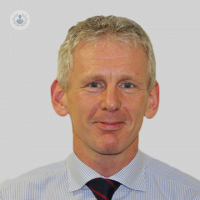What is Asherman's syndrome, and who is most at risk?
Written by:In this article below, Mr Angus J.M. Thomson, a highly revered consultant gynaecologist, explains what Asherman’s syndrome is, and reveals what could happen if the condition is left untreated.

What is Asherman's syndrome?
Asherman’s syndrome is where there is scar tissue or adhesions within the uterine cavity, or in other words, within the uterus where the lining of the womb thickens up to give periods, or where a pregnancy is due to develop. Asherman’s syndrome is scarring in that area.
What are the main symptoms and causes?
There are a variety of different symptoms of Asherman’s syndrome. These include:
- lighter or non-existent periods
- problems or difficulty becoming pregnant
- problems with miscarriages
When we talk about the causes, it’s a combination of three things: uterine instrumentation (during or following previous pregnancy or investigation within uterine cavity), infections of the uterine cavity, and low oestrogen levels in the body.
Therefore, the most common time to get Asherman’s syndrome is after a pregnancy when the uterus has an infection and requires instrumentation, but also at a time when oestrogen levels are low, usually due to breastfeeding.
What could untreated Asherman's syndrome potentially lead to?
The main problems of untreated Asherman’s syndrome are either lack of periods, and problems with getting pregnant or staying pregnant. It can also cause problems in the latter stages of pregnancy. However, most commonly, it leads to women not having periods.
Is it potentially life-threatening?
No. Asherman’s syndrome should not be life-threatening. It would be extremely rare to experience any life-threatening situation as a result of the condition. Very rarely, pregnancy related complications could pose a risk or danger, for example, if the placenta (after birth) becomes stuck to the wall of the uterus.
Who is most at risk, and how is it treated?
The people most at risk of Asherman’s syndrome are people who have had previous operations or infections in the lining of the womb. This typically happens after pregnancy. The treatment, where needed, is to actually do a surgical procedure to release and divide the adhesions, remove the scar tissue, and to rebuild the uterine cavity and keep it open and functioning.
Mr Angus J.M Thomson is a highly esteemed consultant gynaecologist. Book a consultation with him today via his Top Doctors profile.


